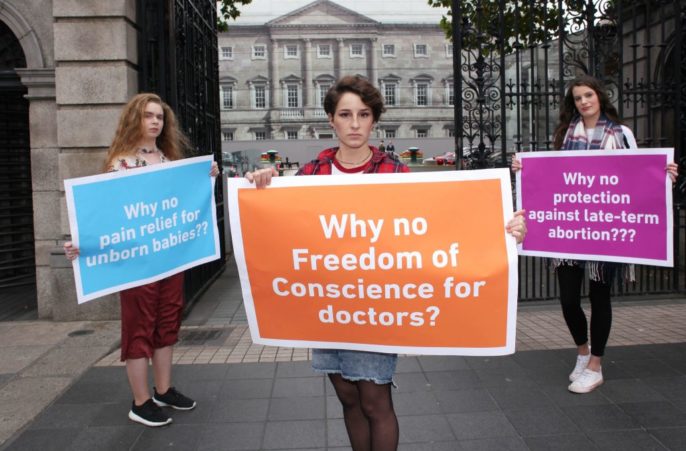Minister Simon Harris has presented his abortion Bill in the Dáil and has confirmed that it will allow only a limited form of conscientious objection.
In the Bill, which is now being discussed in the Oireachtas, there is no provision for institutional conscientious objection, which means that hospitals with a religious ethos will be forced to offer abortions. Also, there is no provision for pharmacists working in hospitals.
A growing number of doctors, including some who supported the repeal of the 8th amendment, are asking the government to amend the Bill so that medical doctors should not be obliged to refer their patients for an abortion, which is a form of participation. However, Minister Harris doesn’t seem ready to concede any change on this matter.
Of all the deputies who have commented on the Bill, only Mattie McGrath has defended the conscience rights of physicians, nurses and midwife. He also made reference to a letter signed by 203 Irish medical doctors, expressing their “profound concern that the Irish College of General Practitioners has not made the issue of freedom of conscience a central part of its consultation with GPs regarding the Government’s proposed new legislation on abortion”.
Louise O’Reilly, speaking for Sinn Féin, said that they “do not agree that medical professionals who invoke the conscience clause should be exempt from referring a patient for the necessary medical treatment they seek.”
Labour Party spokesman for health, Alan Kelly, explicitly requested that institutions should not be granted conscientious objection, and so did Deputy Catherine Murphy. Speaking for the Social Democrats, she said: “While the Minister has assured me that there can be no conscientious objection on the part of institutions, it would be remiss of us to ignore the fact that certain boards of management potentially could instruct staff to adhere to internal regulations. We must ensure the legislation covers such eventualities.”
Deputy Ruth Coppinger (Solidarity – People Before Profit) claimed that “conscientious objection is used as a mechanism in other countries to act as a barrier to abortion. In parts of Italy pregnant women cannot access abortion because doctors refuse it”. A similar statement about Italy was made also by Joan Collins. Italy has a high number of conscientious objectors and for this reason it is a common target of pro-choice campaigners, but they never say that even if the percentage of objectors among doctors has increased with time, this does not affect the general provision of abortion as the requests have diminished significantly. (Read more about Italy here: https://ionainstitute.ie/abortion-rights-activist-target-conscientious-objection-with-false-information/)
Deputy Bríd Smith (Solidarity – People Before Profit) was the most extreme opponent of freedom of conscience: “we need a much stronger impetus whereby objecting doctors must refer on. That referral must be immediate and must never be denied. There has to be a criminal sanction for refusing to do so. If we are going to sanction practitioners criminally for helping women to make the choice, we must criminally sanction those who refuse to help them make that choice. I would like to see a body that polices that operation”.
Pressure to limit conscientious objection is coming from bodies that depend heavily on Government funding, such as the Irish Human Rights and Equality Commission, and the National Women’s Council of Ireland (NWCI). In their response to the Bill, the NWCI wrote: “Protection for women in the case of conscience-based refusal of care (so-called ‘conscientious objection’) requires a clear, legal and policy framework, governing the practice of conscientious objection by healthcare providers, coupled with an effective oversight and complaint mechanism for women”.
It has to be noted the use of the derogative expression “refusal of care”, employed also by Dr Peter Boylan at the Oireachtas Health Committee hearings last week, and by the Abortion Rights Campaign and other pro-abortion organizations in their comments to the Bill. This is a miserable attempt to portray abortion as a form of care, and to stigmatize those who do not want to be involved in its provision. But medical professionals refuse abortion precisely because it doesn’t take care of the second patient, i.e. the unborn child.
According to the Bill, abortion is “a medical procedure which is intended to end the life of a foetus”. How is this care?
“Refusal of care” is an offensive distortion of language. It ignores that conscientious objection is a right internationally recognized—see for instance article 10 of the EU Charter of Fundamental Rights—it is a common feature of abortion legislation across the globe, and no national or international treaty or charter ever refers to objectors in such demeaning terms.

















